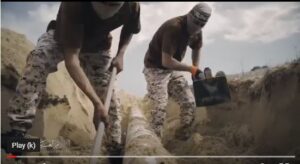- 377
- 385SHARES
“Due to the ban imposed about two months ago by Defense Minister Benny Gantz against bringing raw materials, construction materials and ‘non-humanitarian’ items into the Gaza Strip, most of the damage to its water and sewage infrastructure caused by the war in May has not been repaired,” writes Haaretz‘s Amira Hass today in a page-one article charging Israeli restrictions on incoming materials as the lone culprit in preventing repairs to the territory’s struggling water system (“Israeli restrictions prevents Gaza’s water system from being repaired“).
Moreover, she falsely alleges that the infrastructure’s decrepit state is despite the best efforts of the Palestinian authorities in the Gaza Strip: “This deterioration is happening after several years of major efforts by the Palestinian Water Authority, authorities in the Strip and donor countries to improve the infrastructure.”
Hass inexcusably ignores that the authorities in the Gaza Strip — ie, the Hamas government, recognized as a terror organization by Israel, the United States, the European Union and others — is responsible for digging up water pipes and converting them into rockets used to attack Israel.
The veteran Haaretz journalist quotes Maher al-Najjar, the deputy director of the Gaza Coastal Municipalities Water Utility, “There is nothing more humanitarian that [sic] a regular supply of potable water, but we can’t guarantee that, due to the ban against bringing in basic raw materials and construction materials to the Strip.”
Why didn’t Hass question al-Najjar about his government’s own filling of water pipes with explosives instead of water? What is humanitarian about Hamas turning critical water infrastructure into rockets to indiscriminately attack Israeli civilians in a war crime, all the while depriving its own population of access to the basic necessity?
 Speaking in Arabic in 2019, Hamas leader Yahya Sinwar openly acknowledged the facts that Hass conceals:
Speaking in Arabic in 2019, Hamas leader Yahya Sinwar openly acknowledged the facts that Hass conceals:
One day, some leaders of the Al-Qassam [Brigades] came. They were [responsible] for [missile] production. They said: “There are no pipes with which we can produce missiles. We are out of pipes. There is a ban on bringing iron in from outside, and we cannot bring them through the tunnels – these are long pipes. We will cease production within a month.” I said that Allah will help us find a way. Then, a simple farmer approached one of the men from the Brigades. He said: “I heard that you’re having a problem with pipes for missile production.” The young man told him this was true. The [farmer] said: “I will give you the solution for this.” [The young man said:] “What is it?” He answered: “Come with me.” They went together to the liberated [Israeli] settlements [in Gush Katif]. The [farmer] said: ‘Stop here and let’s get out [of the car]. From here, walk five kilometers, and you will find 10-inch pipes. When the occupiers left the Gaza Strip, they left the irrigation lines. Come here. From here, if you walk straight for 10 kilometers, you will find eight-inch pipes. Come this way. Walk six kilometers, and there are [various] kinds of piping. It is easy to dig here.” The brothers started digging and removed from the ground the pipes that the occupier left behind when it left the Gaza Strip. These would be enough for the Al-Qassam Brigades to manufacture missiles for the next ten years. [Translation by MEMRI.]
This information was easily accessible to the Israeli and international media.The Associated Press, for instance, reported in May:
In a September documentary aired by the Al-Jazeera satellite news network, rare footage showed Hamas militants reassembling Iranian rockets with ranges of up to 80 kilometers (50 miles) and warheads packed with 175 kilograms (385 pounds) of explosives. Hamas militants opened unexploded Israeli missiles from previous strikes to extract explosive materials. They even salvaged old water pipes to repurpose as missile bodies.
In addition, Islamic Jihad leader Ziad Al-Nakhala boasted to Reuters this past May: “The silent world should know that our weapons, by which we face the most advanced arsenal produced by American industry, are water pipes that engineers of the resistance turned into the rockets that you see” (“Israel’s Gaza challenge: Stopping metal tubes turning into rockets“).
 Also in May, blogger Elder of Ziyon shared a video published by Hamas’ Al Qassam Brigades showing its men digging up rockets and converting them into rockets.
Also in May, blogger Elder of Ziyon shared a video published by Hamas’ Al Qassam Brigades showing its men digging up rockets and converting them into rockets.
“The water and sewage system in Gaza presently lacks about 5,000 items,” laments Hass. “The most urgently needed items are valves and water and sewage pipes — all materials made of plastic and metal.”
Imagine had Hamas recycled the settlements’ abandoned water pipes to fill the gaps in their own water infrastructure, instead of repurposing them into 10 years worth of rockets. The Gaza Strip’s water infrastructure might be in an entirely better place. But then what would Amira Hass write?
You know what else contributes to shortages in Gaza’s water infrastructure? Hamas digging up pipes to turn them into rockets @elderofziyon @haaretzcom @CAMERAorg https://t.co/UdDSZKyyWk https://t.co/cmfFOmWKaj pic.twitter.com/vhy52c8FKr
— Tamar Sternthal (@TamarSternthal) July 14, 2021
